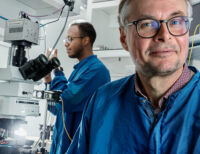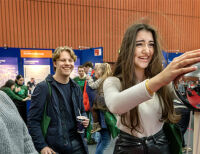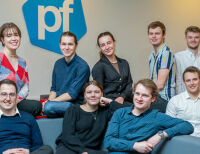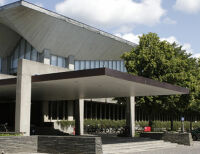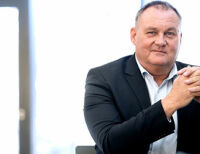Monday 14 Jun 21
Mads Vandborg studies how to prepare the internet for the future by changing the frequency of its signals. He loves technology and is among the 10 per cent of students who are on the honours programme, which is a particularly challenging course of study.
Since Mads Vandborg completed the higher technical examination programme in West Jutland almost six years ago, he’s been passionate about working on projects involving mathematics, physics, and technology. However, he doesn’t see himself as someone who’s smarter than the average person; as he puts it, he’s just fascinated by technology and loves to learn new things. And that’s what drives him and nurtures his passion for studying.
Today he’s 26 and is enrolled in DTU’s honours programme, a voluntary programme that MSc students can apply for. Admittance to the programme requires high grades, and the student commits to completing it within a set time, but in return is offered a programme with extra challenges.
“I applied to be part of the honours programme because I like challenging myself and want to do well. Fortunately I was admitted, which means I’m part of a research group and have been assigned a professor to discuss things with during my Master’s programme. This is a great privilege that I think will really help me in my academic development,” says Mads Vandborg.
Paving the way for the internet of the future
Mads is taking the Master’s programme in Photonics Engineering and is writing his thesis on how to change the wavelength (frequency conversion) of the light particles we use to transport data via the internet’s fibres in the ground.
“I’m trying to figure out how best to transform the frequency of the signals we send through the optical fibres of the internet. Ideally, we’d like to convert the optical signals from about 800 to about 1,500 nanometres. That would have an impact on the network of the future, which researchers are trying to make ultra-safe through quantum encryption,” says Mads Vandborg.
“If it works, hopefully it’ll be possible to use my results to convert optical signals with very high efficiency and with as high a bandwidth as possible. This could be an important building block for the optical communication systems of the future.”
Mads loves creating new technology that can do cool things. But it should also serve a sensible purpose.
“New technology fascinates me, especially when it can be used for good. It’s extra satisfying if what I spend eight hours studying every day can help someone or make the world a slightly better place,” he says.
However, Mads isn’t studying photonics because he has big ambitions of solving a specific problem with his research, but rather because research in this field has lots of practical uses.
“Research in optical communication is important, for example in making the internet more energy-efficient and ultra-safe.”
Free time is important
Although Mads is ambitious and loves his research, like so many others he also had doubts about what he should specialize in for his Master’s. His interest in optical communication arose during his BSc in electrical engineering. Along the way, Mads took courses in optics and electromagnetism, which helped him hone in on his subject area.
“I thought it was exciting physics with a lot of applications, which led me to continue taking courses and doing projects within that field. And it got really exciting when I got into the honours programme and was hooked up with Professor Karsten Rottwitt and his research group, with whom I’ve since worked on several projects,” says Mads.
Mads makes no secret of the fact that it’s sometimes hard to be an honours student. If you ask him if he would recommend the course to others, the answer is that you have to be ready to commit to a stay abroad, summer school, and special courses. If you are, the programme is a good and exciting challenge.
“The maths and physics can be hard, and I spend a lot of time researching my thesis right now, but the honours programme has also offered exciting courses. However, I also make sure to make time for the other important things in my life, like my girlfriend, family, and football, because you don’t become a better student or smarter by spending every night studying all year round. It’s important to do other nice things too.”
It remains to be seen what Mads will do after his thesis, but he dreams of working with research and development on projects similar to the one he’s working on now. It may be in an industry, but it could also be at a university like DTU.











